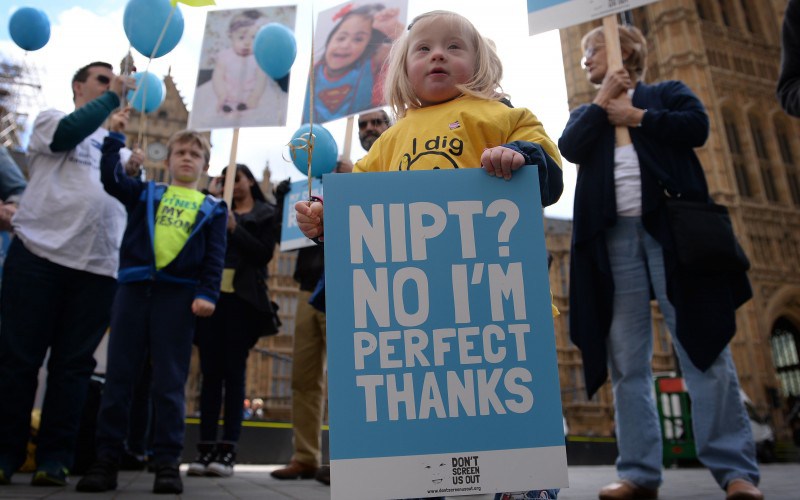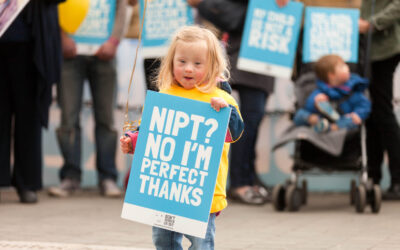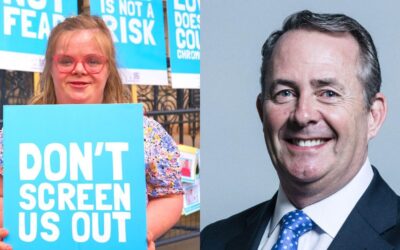Press release for immediate release
Govt announce roll-out of new Down’s syndrome test that will likely see rise in abortions
The number of babies with Down’s Syndrome aborted is likely to increase following a decision announced by the Government.
People with Down’s syndrome, their families and campaign groups are very disappointed that a new prenatal test that is projected to lead to a profound increase in the number of children with Down’s syndrome screened out by termination is going to be rolled-out by the Department of Health and Social Care without responding to the very real concerns of those in the Down’s syndrome community.
The UK Government have announced plans to procurement and roll-out of the non-invasive prenatal testing (NIPT) technique called ‘cell-free DNA’ (cfDNA) to all health boards in England.
Recently, an investigation by The Sunday Times found that the number of babies born with Down’s syndrome has fallen by 30% in the small number of NHS hospitals that have introduced the new form of screening.
This situation is set to get worse as the Government with the rollout of the test across England.
The National Institute for Health and Research RAPID evaluation study projects that the proposed implementation will result in more babies with Down’s syndrome being identified each year and based on the current 90% of parents with a diagnosis that terminate a pregnancy, this is projected to result in more terminations where babies have the condition.
In its 2017 report on NIPT the Nuffield Council of Bioethics warned that the UK National Screening Committee should take better consideration of the particular consequences, some perhaps unintended, of prenatal screening programmes where termination of pregnancy is an option.
The Don’t Screen Us Out campaign calls on the government to halt the implementation of cfDNA screening and to introduce reforms which would support those with Down’s syndrome and their families. cfDNA may only worsen the culture of informally eugenic anti-disabled discrimination that exists in the Fetal Anomaly Screening Programme.
Lynn Murray, spokesperson for the Don’t Screen Us Out campaign said:
“As a mother of a daughter who has Down’s syndrome, I see every day the unique value she brings to our family and the positive impact she has on others around her.
“Figures released earlier this year show that the fears of the Down’s syndrome community that rolling out these tests would lead to a large drop in the number of babies with Down’s syndrome were not unfounded.
“While the screening itself is being heralded as a move to reduce the number of miscarriages associated with invasive amniocentesis, figures published in the Sunday Times last December revealed that the number of babies born with Down’s syndrome fell by 30% in NHS hospitals that have already introduced the new test. When this test is rolled out across the country, we can expect to see this situation replicated elsewhere. Such outcomes are likely to have a profoundly negative impact on the Down’s syndrome community.”
“We are calling on the Government to halt the further roll-out of the tests on the NHS immediately and to undertake an urgent inquiry into the impact that these tests are having on birth numbers of babies with Down’s syndrome.”
“There also needs to be greater support for parents who are expecting a child with Down’s syndrome.”
“Despite Nuffield Council of Bioethics’ 2017 call for RCOG to take immediate action and introduce professional guidance to cover the continuation of pregnancy after a diagnosis of fetal anomaly there are still no guidelines to support women who choose to continue their pregnancies after finding that their baby has Down’s syndrome.”
“There is mounting evidence that an unconscious bias exists in the FASP programme. We need the right reforms to turn things around and ensure that the tenets of diversity and inclusivity extend to screening conversations in the NHS.”
ENDS
- For more information on the Don’t Screen Us Out campaign, see our website www.dontscreenusout.org or email info@dontscreenusout.org
- For interviews, contact Don’t Screen Us Out spokesperson Lynn Murray on 0784 0966 736 or email info@dontscreenusout.org
- A 2015 UN report from the International Bioethics Committee (IBC) of the United Nations Educational, Social, and Cultural Organisation (UNESCO) issued a stern warning about the drive to adopt NIPT in national screening programmes, “the potential ethical disadvantages of NIPT can be summarised as routinisation and institutionalisation of the choice of not giving birth to an ill or disabled child”.
- The Governmental enabling of such an approach, also violates the UK’s treaty obligations to the UN Convention on the Rights of Persons with Disabilities (CRPD) to make sure that its health policies – including antenatal screening – are informed by and reflective of a ‘social model’ understanding of disability. As indeed does the haphazard medical support for parents whose child is found to have fetal disability, which leads to pressure on parents to abort their babies with disabilities such as trisomy 21 and causes the conditions that drive the low proportion of Down’s syndrome births. Both constitute a failure to implement article 23 of the CRPD to eliminate discrimination and to provide early and comprehensive support to families with children who have Down syndrome.
- The Don’t Screen Us Out campaign calls on the government to halt the implementation of cfDNA screening and to introduce reforms which would support those with Down’s syndrome and their families. cfDNA may only worsen the culture of informally eugenic anti-disabled discrimination that exists in the Fetal Anomaly Screening Programme.
- On 19 November 2015 the UK National Screening Committee published recommendations around the introduction of cfDNA as a contingent test within the UK Fetal Anomaly Screening Programme (FASP) for women receiving higher chance results from first line screening for trisomy 13, trisomy 18 and trisomy 21. The recommendations included further evaluative work to better understand what would need to be answered before full implementation, and approach to addressing these issues together with the practical impact to the screening programme if implemented. Also recommended was that the evaluative work should be informed by work on ethics and NIPT by the Nuffield Council of Bioethics. https://legacyscreening.phe.org.uk/policydb_download.php?doc=1266
- Nuffield Council of Bioethics published a 169-page report on NIPT in March 2017. https://www.nuffieldbioethics.org/publications/non-invasive-prenatal-testing
- NIPT techniques will shortly allow for the testing of the entire human genome, and the targeting of fetuses for abortion based on a range of illicitly considered characteristics. https://www.gov.uk/government/publications/generation-genome-and-the-opportunities-for-screening-programmes
- BGI Employee telling visitors that prenatal screening is a ‘cash cow’ (courtesy of Al-Jazeera) https://youtu.be/fCEKXY52X1U



